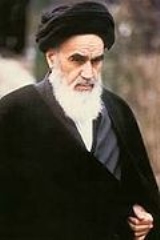
Ruhollah Musavi Khomeini was an Iran
ian religious leader and politician, and leader of the 1979 Iranian Revolution
which saw the overthrow of Mohammad Reza Pahlavi
, the Shah
of Iran. Following the revolution, Khomeini became the country's Supreme Leader
— a position created in the constitution
as the highest ranking political and religious authority of the nation — until his death.
Khomeini was a marja
("source of emulation", also known as a Grand Ayatollah) in Twelver Shi'a Islam
, author of more than 40 books, but is most famous for his political role.
If the ulema|religious leaders have influence, they will not permit girls and boys to wrestle together, as recently happened in Shiraz|Shiraz.![]()
The people will not rest until the Pahlavi rule has been swept away and all traces of tyranny have disappeared. As long as the Shah's satanic power prevails, not a single true representative of the people can possibly be elected.![]()
Women are free in the Islamic Republic in the selection of their activities and their future and their clothing.![]()
Personal desire, age, and my health do not allow me to personally have a role in running the country after the fall of the current system.![]()
In Iran's future Islamic system everyone can express their opinion, and the Islamic government will respond to logic with logic.![]()
In the Islamic government all people have complete freedom to have any kind of opinion.![]()
After the Shah's departure from Iran, I will not become a president nor accept any other leadership role. Just like before, I limit my activities only to guiding and directing the people.![]()
Ayatollah, would you be so kind as to tell us how you feel about being back in Iran?Nothing. I don't feel anything. (Hichi. Hich ehsasi nadaram)![]()

